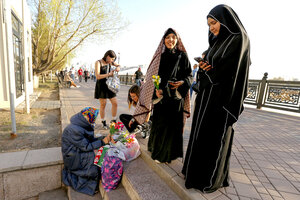A social earthquake in Eurasia
In a region short on women’s rights and equality before the law, a court verdict on domestic violence in Kazakhstan starts ripples of change.

Two women buy flowers in Astana, Kazakhstan. A high-profile trial involving the killing of Saltanat Nukenova has raised awareness of spousal abuse in the Central Asian country.
AP
Since late March, much of Eurasia from Armenia to Mongolia has been transfixed by a court case of a former top official in Kazakhstan who killed his wife. On May 13, the man was sentenced to 24 years in prison. Not only was his violent action caught on camera, but the trial was also livestreamed – a first in Kazakhstan – for millions to watch.
More than two-thirds of Kazakhs followed the trial over six weeks. Even a famous Russian TV news presenter was in the courtroom, writing on social media that a “quiet revolution” was taking place in Kazakhstan, a country of some 20 million at the heart of Eurasia.
In a region not strong on women’s rights and equality before the law, the trial of Kuandyk Bishimbayev, once a member of Kazakhstan’s political elite, had an impact even before the guilty verdict. The legislature passed a law – widely known as “Saltanat’s Law,” for the first name of Mr. Bishimbayev’s wife – that criminalizes domestic violence. The law takes effect June 15.
In another sign of progress in a largely patriarchal society, both the judge and the prosecutor were women. “Family and domestic violence is a pressing problem,” prosecutor Aizhan Aimaganova told Tengrinews. “I hope that after this trial, women will realize that going to law enforcement is not useless.”
An estimated 80% of women of working age in Kazakhstan have been victims of domestic abuse. Only 2 out of 10 survivors ever file a case against their offenders.
The slain wife’s brother, Aitbek Amangeldi, told Nikkei Asia that the trial has changed public attitudes, “that is to say, that violence is now becoming unacceptable to society.” According to two scholars writing in Foreign Policy, the trial snapped the people of Kazakhstan “out of their despair and has become a symbol of hope that the law can lead to justice – not just be used by the government to repress dissent.”
Just over half of countries have comprehensive laws addressing domestic violence, according to the World Bank. In Kazakhstan, the trial has not only changed the law but has also led President Kassym-Jomart Tokayev to admit the high level of violence against women and girls – and the need for further work to end it.
“Everyone should be equal before the law,” he said last November after the killing of Saltanat Nukenova. “A just Kazakhstan is a country where law and order triumph.”

